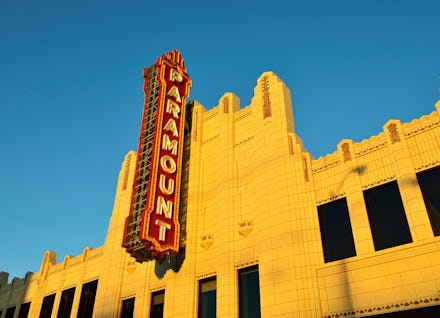In the age of streaming, who will save the movie theaters?

The streaming service boom has brought us choice surplus: we can watch movies and television from all over the world with a few clicks and a relatively affordable monthly subscription. The existence of these platforms has disincentivized plenty of things: making weekend plans, making weeknight plans, leaving your home when you don’t need to. But they’ve really done a number on the appeal of going to the movies. For $11 a month (almost half the price of a movie ticket at most theaters in New York City), you have access to thousands of titles at any given moment. And now that streaming platforms are slowly becoming some of the biggest studios in Hollywood, you’re not even missing out on new releases; everything exists in the confines of your smart TV or laptop.
Of course, as good as that is for your wallet and perhaps even your stress levels, it’s having somewhat disastrous consequences for movie theaters, and for anyone who enjoyed the experience of them. As companies like Amazon and Netflix become the executives behind major films, it means they choose which films will get the “full theatrical release,” which films will get the “limited theatrical release,” and which movies will go straight to streaming.
Netflix was first to perfect the strategy of the limited release. They did so with films like their Oscar-winning Roma, which had a limited theatrical release for two weeks before being put online. After the movie's award season cleanup, it was put into more theaters. Other films on their production schedule are slated to receive similar treatment, even films that appear to be traditionally attractive to theater audiences. For example, the Meryl Streep and Antonio Banderas led The Laundromat directed by Steven Soderbergh, released in theaters on September 27, will only spend a few weeks in select cinemas before releasing onto Netflix on October 18.
Streep, during a press event for the film, told Variety that this format was good for movies like The Laundromat, which might not appeal to wide audiences in theaters, but nonetheless would be reached by millions in their homes.
“If it were released in theaters, I don’t know, several thousand people in Manhattan, Boston and Los Angeles, who gravitate toward the material, would see it,” Streep told Variety. “Netflix is in 133 million households globally. It will reach places where it would not have normally been found. And that’s great because it really is for the audience who doesn’t know about it already.”
While Streep was able to square this logic for her film with Netflix, the strategy isn’t as widely appreciated over at Amazon. The company has also produced a number of big films. Life Itself, Late Night and Beautiful Boy were all Amazon Studios films that enjoyed major releases before being put on Prime for streaming. But as the movie theater industry continues to struggle, Amazon is choosing to cut its losses.
The Aeronauts, a big-budget film starring Eddie Redmayne and Felicity Jones, about a hot-air-balloon daredevil, was originally slated to receive a full theatrical release in December. According to Deadspin, Amazon reduced this release to just two weeks in limited theaters before a release onto streaming platforms. The reasoning is likely to the recent spate of box office disappointments. Mindy Kaling’s Late Night only made $22 million in theaters –– not nearly enough to justify the $14 million spent on getting a wide release. But the limited release of The Aeronauts was a disappointment for director Tom Harper, who told the New York Times that he didn’t create the movie to be seen on people’s laptops.
“It’s not how [the movie is] intended to be seen,” Harper said. “But it’s a changing world, and I want people to see the movie. If it were up to me, I’d tell them to see it in the theaters.”
Netflix and Amazon have plenty of reasons to avoid major theatrical releases: they aren’t required to qualify for awards season, they are expensive, and according to recent data, people just aren’t going to movie theaters anymore. A June report from Bloomberg revealed that while Disney films from the Marvel Cinematic Universe and their live-action reboots of animated classics are keeping the theater industry afloat with massive blockbusters. Overall ticket sales are down 10% from last year, and the value of theater giant AMC’s stock has plummeted by 25%.
And with Disney’s own streaming app on the horizon, who knows if they’ll decide to give the limited release treatment to films they don’t think will earn enough money to justify the cost of a major release. And if Disney stops releasing films that draw the big audiences, it’s unclear which theaters will be able to afford such a dip in audiences — or if any other films will be able to draw the crowds that the Disney films have.
Fewer films from the most sought after actors and directors will be put into theaters outside of a few key cities — and the lure of saving the price of a ticket to watch the movie at home a few weeks later might mean that the thrill of sitting inside of a dark cinema, with perfect surround sound and freshly buttered movie theater popcorn, can be lost. And that’s a lose-lose for everyone.